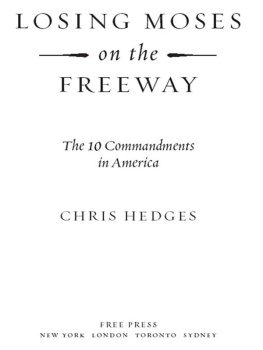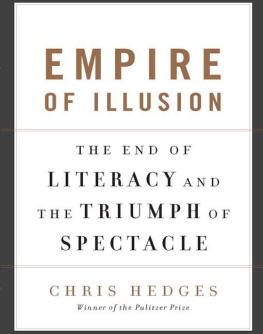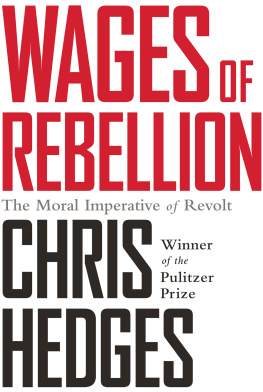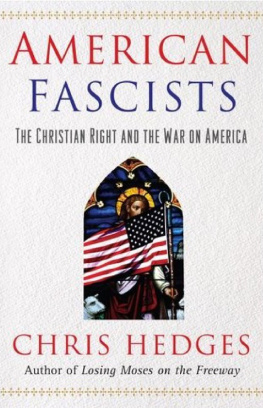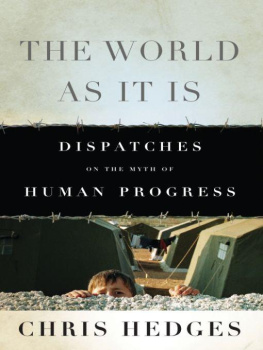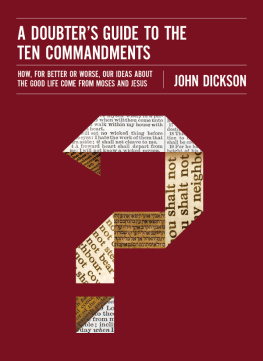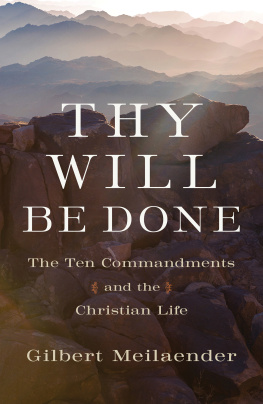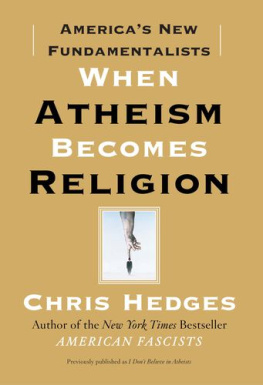FREE PRESS and colophon are trademarks of Simon & Schuster, Inc.
The 10 Commandments
You shall have no other gods before me.
You shall not make for yourself a graven image, or any likeness of anything that is in heaven above, or that is in the earth beneath, or that is in the water under the earth; you shall not bow down to them, or serve them.
You shall not take the name of the Lord your God in vain.
Remember the sabbath day, to keep it holy.
Honor your father and your mother.
You shall not kill.
You shall not commit adultery.
You shall not steal.
You shall not bear false witness against your neighbor.
You shall not covet your neighbors house.
Prologue
The commandments are a list of religious edicts, according to passages in Exodus and Deuteronomy, given to Moses by God on Mount Sinai. The first four are designed to guide the believer toward a proper relationship with God. The remaining six deal with our relations with others. It is these final six commands that are given the negative form of You Shall Not. Only two of the commandments, the prohibitions against stealing and murder, are incorporated into our legal code. Protestants, Catholics and Jews have compiled slightly different lists, but the core demands of the commandments remain the same. Muslims, while they do not list the commandments in the Koran, honor the laws of Moses, whom they see as a prophet.
The commandments are one of the earliest attempts to lay down rules and guidelines to sustain community. The commandments include the most severe violations and moral dilemmas in human life, although these violations often lie beyond the scope of the law. They were for the ancients, and are for us, the rules that, when honored, hold us together and when dishonored lead to alienation, discord and violence.
The commandments choose us. We are rarely able to choose them. We do not, however hard we work to insulate ourselves, ultimately control our fate. We cannot save ourselves from betrayal, theft, envy, greed, deception and murder, nor always from the impulses that propel us to commit these acts. These violations, often committed without warning, can leave deep, lifelong wounds. Most of us wrestle profoundly with at least one of these violations.
My renewed fascination with the depth and breadth of the commandments came shortly after I returned to New York City after nearly two decades as a foreign correspondent who covered conflicts in Latin America, Africa, the Middle East and the former Yugoslavia. I was unsure of where I was headed. I had lost the emotional and physical resiliency that allowed me to cope in war. I was plagued by memories I wanted to forget, waking suddenly in the middle of the night, my sleep shattered by visions of gunfire and death. I felt alienated from those around me, unaccustomed to the common language and images imposed by popular culture, unable to communicate the pain and suffering I had witnessed, not much interested in building a career.
We lived in a tiny apartment in Manhattan. My son and daughter shared a bedroom. The monthly mortgage payments plunged me into debt. I had, in the past, rarely seen or spoken with editors, who were hundreds or thousands of miles away. I was uncomfortable in the newsroom. My solace came in walking the streets of the city after taking my son and daughter to school. I started early one morning at the very bottom of Manhattan. I walked eighty blocks uptown, peering into some shops, ignoring others, brushing past the mix of races and nationalities, listening to the variety of languages and the din of the streets. These mosaics comforted me. There are too many differences in New York to force iron conformity. I had reported from over fifty countries. The narrow definitions of race, religion and nation had been broadened and erased by friendship and experience, by the recognition that those we sometimes find alien and strange often reflect back to us parts of ourselves we do not understand.
The Brooklyn Academy of Music was showing a ten-part series called The Decalogue. The Decalogue is the classical name of the 10 Commandments. Deka-, in Greek, means ten. Logos means saying or speech. The director, I read in the announcement, was the Polish filmmaker Krzysztof Kieslowski who had made a trilogy called White, Blue and Red. The Decalogue films, each about an hour and based on one of the commandments, were to be shown two at a time over five consecutive weeks. I saw them on Sunday nights, taking the subway to Brooklyn, its cars rocking and screeching along the tracks in the darkened tunnels. The theater was rarely more than half full.
The films were quiet, subtle and often opaque. It was sometimes hard to tell which commandment was being addressed. The characters never spoke about the commandments directly. They were too busy, as we all are, coping with the duress of life. The stories presented the lives of ordinary people confronted by extraordinary events. All lived in a Warsaw housing complex, many of them neighbors, reinforcing the notion of our being on a common voyage, yet also out of touch with the pain and dislocation of those around us. The commandments, Kieslowski understood, were not dusty relics of another age, but spoke in important ways to the human predicament.
He dealt with the core violations raised by the commandments. He freed the commandments from the clutter of piety. The promiscuous woman portrayed in the film about adultery was not married. She had a series of carnal relationships. Adultery, for the director, was at its deepest level sex without love. The father in the film about honoring our parents was not the biological father. Yet the biological mother was absent in the daughters life. Parenting, Kieslowski understood, is not defined by blood or birth or gender. It is defined by commitment, fidelity and love.
I knew the commandments. I had learned them at Sunday school, listened to sermons based on the commandments from my fathers pulpit and studied them as a seminarian. But watching Kieslowski turn them into living, breathing entities gave them a new resonance.
For 6,000 years these rules have been unquestionably right, Kieslowski said of the commandments. And yet we break them every day. We know what we should do, and yet we fail to live as we should. People feel that something is wrong in life. There is some kind of atmosphere that makes people turn now to other values. They want to contemplate the basic questions of life, and that is probably the real reason for wanting to tell these stories.

